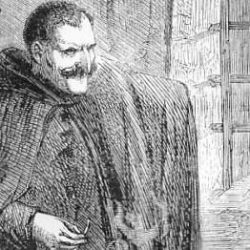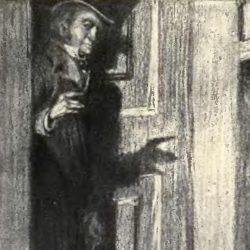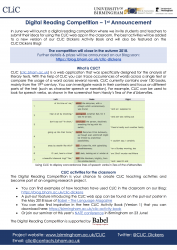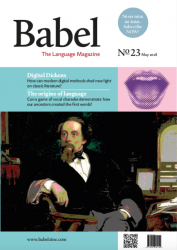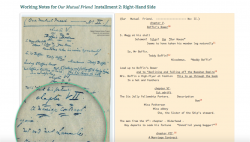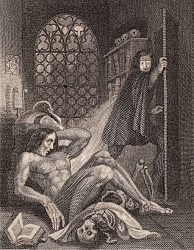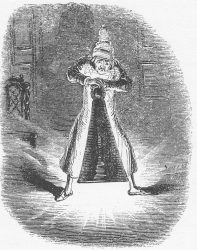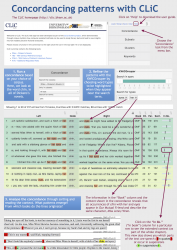In this guest post, Colette Ramuz (Royal Holloway) explores textual patterns related to the mouth in a subsection of the CLiC corpus of Dickens’s Novels. She argues that the use of digital tools can help advance our understanding of Dickens’s representations of embodiment and sexuality. It is a commonplace that sexuality was considered a taboo topic … Continue reading “Finding the biting point: Desire and biting males in Dickens’s ‘The Pickwick Papers’ and ‘The Old Curiosity Shop’”
Tag: CLiC
Distance-reading the feminine landscapes of The Awakening
In this guest post, Heather Froehlich, Digital Scholarship Fellow in Text Analysis and Assistant Librarian at Pennsylvania State University, shows that digital humanities is not all about big data but can also provide useful insights on a smaller scale. She demonstrates this with a case study of Kate Chopin’s novella The Awakening. One thing we digital … Continue reading “Distance-reading the feminine landscapes of The Awakening”
Signposting and gatekeeping the supernatural: Servants and doors in The Strange Case of Dr Jekyll and Mr Hyde
In this guest post teacher Claire Stoneman shares her passion for Victorian literature with a case study of servants and agency in The Strange Case of Dr Jekyll and Mr Hyde. She emphasises the role of doors in this context – reiterating the importance of doors in this novella, which our Blog readers may remember from Lorraine … Continue reading “Signposting and gatekeeping the supernatural: Servants and doors in The Strange Case of Dr Jekyll and Mr Hyde”
CLiC Digital Reading Competition coming up!
In June we will launch a digital reading competition where we invite students and teachers to submit their ideas for using the CLiC web app in the classroom. The best activities will be added to a new version of our CLiC Dickens Activity Book and will also be featured here on the CLiC Dickens Blog! … Continue reading “CLiC Digital Reading Competition coming up!”
CLiC to subscribe: Babel is pleased to support the CLiC project
Dan McIntyre (@danguage on Twitter) is Professor of English Language and Linguistics at the University of Huddersfield and one of the editors of the hugely popular Babel: The Language Magazine. He is also a member of the CLiC Advisory Panel and a keen supporter of the CLiC project. Dan’s research interests include corpus linguistics, stylistics, … Continue reading “CLiC to subscribe: Babel is pleased to support the CLiC project”
Dickens, Wooden Legs and the Dickensian Cyberspace
Emma Curry (@EmmaLCurry on Twitter) completed her PhD thesis, titled “Language and the Fragmented Body in the Novels of Charles Dickens”, in 2016 at Birkbeck, University of London. Her research interests include Dickens, nineteenth-century fiction, digital humanities, the body in literature, and the history of emotions. During her time at Birkbeck she spearheaded the ‘Our Mutual Friend Tweets‘ project, … Continue reading “Dickens, Wooden Legs and the Dickensian Cyberspace”
Revising Frankenstein with CLiC Dickens
Beth Kemp (@BethKemp on Twitter) is an English teacher, A Level examiner, teacher trainer and writer of textbooks and study guides for A Level, GCSE and KS3. She is also passionate about reading for pleasure and contemporary YA literature, finding that language and books of various kinds tend to dominate her work and her leisure. Looking … Continue reading “Revising Frankenstein with CLiC Dickens”
What’s in a Word: Exam-ready with CLiC
Kat Howard (@SaysMiss on Twitter) is an English teacher at Brockington College, an 11-16 Secondary School in South Leicestershire. Previously undertaking roles such as Literacy Coordinator and overseeing KS3 Curriculum Planning and Assessment, Kat provided T&L training through the National College of Teaching and Leadership and has written resourcing content for a range of providers … Continue reading “What’s in a Word: Exam-ready with CLiC”
CLiC guest post on the Blog of the Digital Literary Stylistics Special Interest Group (#SIG_DLS)
We are very pleased to announce a CLiC guest post on the Blog of the Digital Literary Stylistics Special Interest Group (also see the Twitter hashtag #SIG_DLS), which is curated by J. Berenike Herrmann (@Jberenike on Twitter) at the University of Basel’s Digital Humanities Lab. This special interest group brings together researchers from different perspectives … Continue reading “CLiC guest post on the Blog of the Digital Literary Stylistics Special Interest Group (#SIG_DLS)”
CLiC in the classroom
Lorraine Adriano has taught in secondary schools in England and Italy. She was curriculum leader for KS3 and Head of Department, developing schemes of work and assessments. Lorraine now teaches English language and English literature years 7-13 at Bishop Walsh Catholic Secondary School. She is an examiner for both English language and English literature at GSCE and is … Continue reading “CLiC in the classroom”

